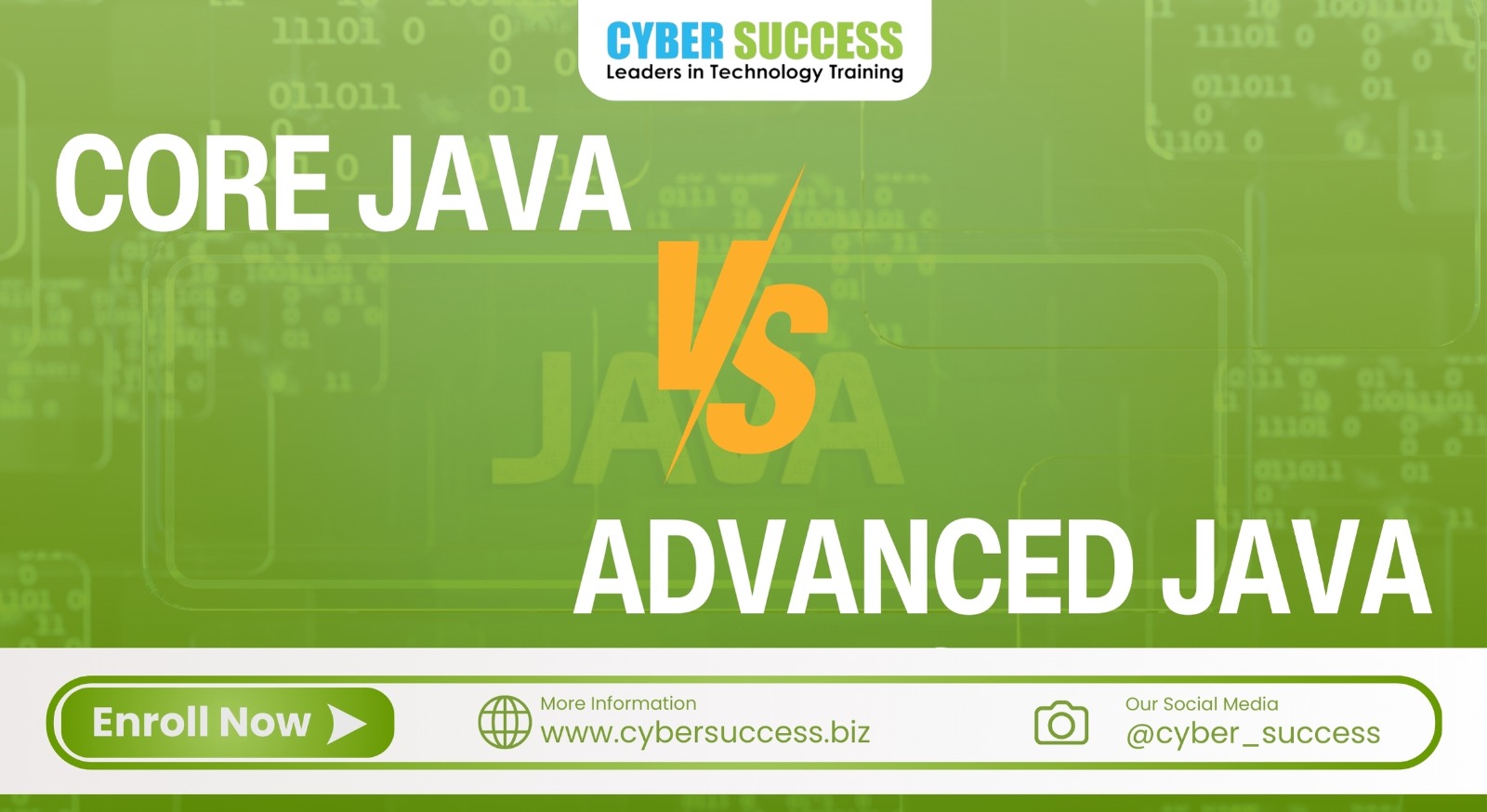Core Java vs Advanced Java: Understanding the Differences
Core Java vs Advanced Java: Understanding the Differences
Java has been a fundamental part of programming for many years, and its popularity keeps rising due to the growing need for Java Full Stack Developers. Whether you’re just starting out or have years of experience, grasping the differences between Core Java and Advanced Java is vital for mastering this adaptable language. In this blog, we will explore the main differences, their use cases, and the importance of learning both for aspiring developers.
What is Core Java?
Core Java is the essential foundation of the Java programming language. It includes the fundamental concepts and libraries that every Java developer needs to understand. Core Java serves as the starting point for anyone aspiring to pursue a career in Java development.
Key Features of Core Java:
- Object-Oriented Programming (OOP): Core Java introduces key OOP principles such as inheritance, polymorphism, encapsulation, and abstraction.
- Core Libraries: It encompasses vital libraries like java.lang, java.util, java.io, and others.
- Basic Syntax: Core Java addresses data types, loops, conditional statements, and exception handling.
- Multithreading and Concurrency: Concepts such as threads and synchronization are fundamental to Core Java.
- Standard APIs: APIs for networking, file handling, and collections are essential components of Core Java.
Core Java is extensively utilized for creating standalone applications, including desktop software and utilities. It serves as the foundation for more advanced applications, making it a crucial skill for anyone aiming to become a Java Full Stack Developer.
What is Advanced Java?
Advanced Java builds on the foundation established by Core Java, focusing on specialized tools and technologies for creating enterprise-level and web-based applications. It’s often referred to as the “backend” of Java development.
Key Features of Advanced Java:
- Web Development: Advanced Java encompasses technologies such as Servlets, JSP (Java Server Pages), and frameworks like Spring and Hibernate.
- Database Connectivity: JDBC (Java Database Connectivity) is a fundamental component for database interaction.
- Enterprise Applications: Advanced Java includes concepts like Enterprise JavaBeans (EJB) for developing large-scale applications.
- Networking and Distributed Computing: It supports the creation of distributed systems using RMI (Remote Method Invocation) and web services.
- Frameworks and Tools: Advanced Java works with popular frameworks like Spring Boot, Struts, and Hibernate to facilitate faster and more efficient development.
Advanced Java is mainly utilized for developing dynamic web applications, APIs, and large-scale enterprise solutions. Mastering Advanced Java is essential for those aspiring to become Java Full Stack Developers.
Core Java vs Advanced Java: Key Differences
- Aspect
- Core Java
- Advanced Java
- Purpose
- Basics of Java programming and standalone apps
- Enterprise and web-based applications
- Scope
- Fundamental concepts
- Specialized tools and frameworks
- Technologies Covered
- OOP, Collections, Multithreading, etc.
- Servlets, JSP, JDBC, Spring, Hibernate
- Use Cases
- Desktop applications, utilities
- Web apps, APIs, enterprise solutions
- Learning Path
- Beginner-friendly
- Intermediate to advanced
Why Learn Both?
For those aiming to become Java Full Stack Developers, it’s essential to master both Core Java and Advanced Java. Core Java lays the groundwork for writing efficient and optimized code, while Advanced Java provides the necessary tools for creating scalable, high-performance applications. This combination enables you to manage both the frontend and backend of application development, which is a vital skill set in today’s job market.
How to Get Started?
If you’re just starting with Java, begin with Core Java. Concentrate on grasping the syntax, OOP principles, and basic libraries. After establishing a solid foundation, move on to Advanced Java to explore web development, frameworks, and database integration. A structured learning path, such as a Java Full Stack Developer course, can effectively guide you through this process. Seek out courses that offer hands-on experience, real-world projects, and thorough coverage of both Core and Advanced Java.
Why Choose Cyber Success for Java Programming?
Cyber Success IT Training Institute in Pune stands out as a premier destination for mastering Java programming. Here’s why:
- Comprehensive Courses: Cyber Success provides well-organized Java Full Stack Developer courses that cover both Core and Advanced Java concepts, including the latest frameworks and tools.
- Experienced Trainers: Learn from industry professionals who bring hands-on experience in Java development to the classroom.
- Practical Learning: Participate in real-world projects, case studies, and capstone assignments to reinforce your understanding.
- Placement Assistance: With a commitment to 100% job assistance and unlimited job calls, Cyber Success makes your transition from learning to employment smooth and effective.
- ISO/IAF Certified: Obtain a certification that enhances your resume and boosts your credibility as a Java professional.
- Best in Pune: With cutting-edge facilities and a proven success record, Cyber Success is the top choice for Java programming in Pune.
If you’re seeking a trustworthy institute to begin your journey as a Java Full Stack Developer, Cyber Success is the place to be. Enroll today and take the first step toward a fulfilling career in Java development! With the increasing demand for skilled Java developers, now is the perfect time to invest in your education. Whether you want to master Core Java concepts or explore Advanced Java frameworks, a structured approach will guide you toward success. Choose the right course, practice consistently, and fully embrace this exciting programming language.
Ready to take the next step? Enroll in our Data Science Course or Data Analytics Course and unlock new career opportunities. The future of data is bright—be part of the revolution!
Contact Us At: +91 9226913502 | +91 9168665644


